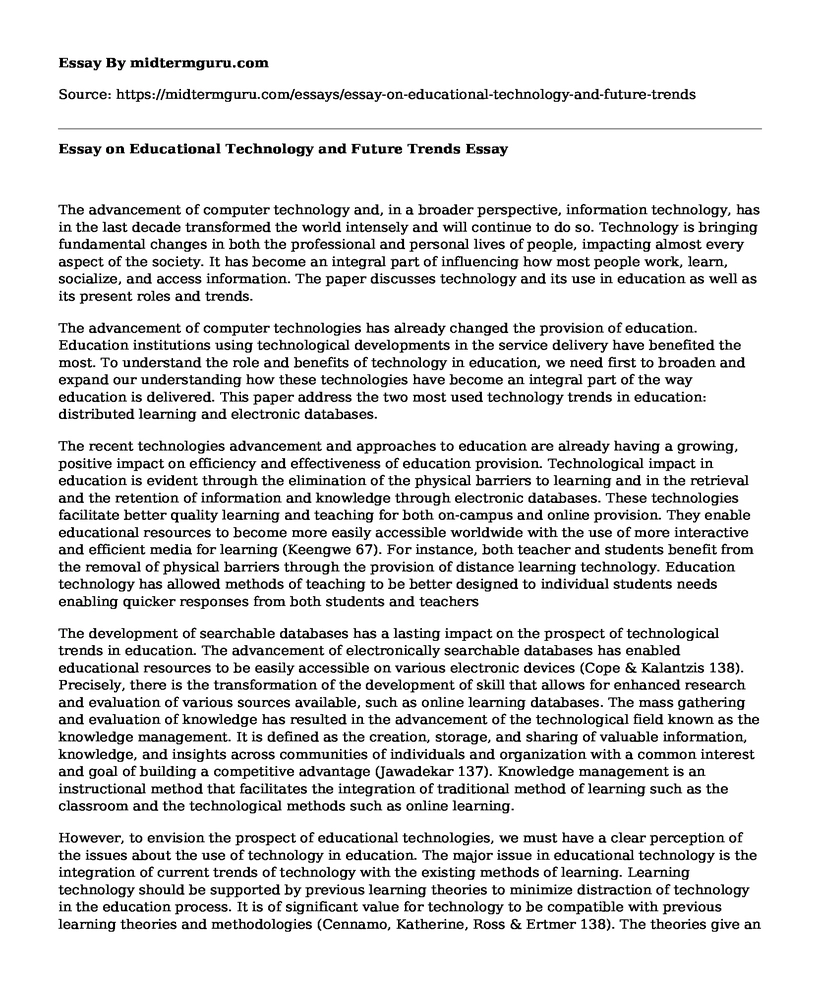The advancement of computer technology and, in a broader perspective, information technology, has in the last decade transformed the world intensely and will continue to do so. Technology is bringing fundamental changes in both the professional and personal lives of people, impacting almost every aspect of the society. It has become an integral part of influencing how most people work, learn, socialize, and access information. The paper discusses technology and its use in education as well as its present roles and trends.
The advancement of computer technologies has already changed the provision of education. Education institutions using technological developments in the service delivery have benefited the most. To understand the role and benefits of technology in education, we need first to broaden and expand our understanding how these technologies have become an integral part of the way education is delivered. This paper address the two most used technology trends in education: distributed learning and electronic databases.
The recent technologies advancement and approaches to education are already having a growing, positive impact on efficiency and effectiveness of education provision. Technological impact in education is evident through the elimination of the physical barriers to learning and in the retrieval and the retention of information and knowledge through electronic databases. These technologies facilitate better quality learning and teaching for both on-campus and online provision. They enable educational resources to become more easily accessible worldwide with the use of more interactive and efficient media for learning (Keengwe 67). For instance, both teacher and students benefit from the removal of physical barriers through the provision of distance learning technology. Education technology has allowed methods of teaching to be better designed to individual students needs enabling quicker responses from both students and teachers
The development of searchable databases has a lasting impact on the prospect of technological trends in education. The advancement of electronically searchable databases has enabled educational resources to be easily accessible on various electronic devices (Cope & Kalantzis 138). Precisely, there is the transformation of the development of skill that allows for enhanced research and evaluation of various sources available, such as online learning databases. The mass gathering and evaluation of knowledge has resulted in the advancement of the technological field known as the knowledge management. It is defined as the creation, storage, and sharing of valuable information, knowledge, and insights across communities of individuals and organization with a common interest and goal of building a competitive advantage (Jawadekar 137). Knowledge management is an instructional method that facilitates the integration of traditional method of learning such as the classroom and the technological methods such as online learning.
However, to envision the prospect of educational technologies, we must have a clear perception of the issues about the use of technology in education. The major issue in educational technology is the integration of current trends of technology with the existing methods of learning. Learning technology should be supported by previous learning theories to minimize distraction of technology in the education process. It is of significant value for technology to be compatible with previous learning theories and methodologies (Cennamo, Katherine, Ross & Ertmer 138). The theories give an understanding of how individuals learn and thus, offer approaches for designing effective education programs. Therefore, information technology is most useful and efficient for educational purposes when it is compatible with previously researched learning theory.
Given the significant impact of existing technology in various fields, further successful advancement of educational technology can be expected. The new approaches of education technology such as online learning bring specific challenges. But given the positive impact and opportunities they offer for the long term and short term learning, it is important that education stakeholders deliberate how these learning opportunities can be more beneficial to the education system. There are several concerns that have not yet been fully addressed regarding quality and broader reception of these learning experiences. An informed action is desirable to address these concerns. Guidelines for quality assurance and developing a means of providing an unbiased competitive educational technology will advance efforts to implement them as a credible approach to learning.
Works cited
Jawadekar, W S. Knowledge Management. New Delhi: Tata McGraw-Hill Education, 2011. Print.
Keengwe, Jared. Research Perspectives and Best Practices in Educational Technology Integration. Hershey PA: Information Science Reference, 2013. Internet resource.
Cennamo, Katherine, John D. Ross, and Peggy A. Ertmer. Technology Integration for Meaningful Classroom Use: A Standards-Based Approach. , 2014. Print.
Cope, Bill, and Mary Kalantzis. Ubiquitous Learning. Urbana: University of Illinois Press, 2009. Internet resource.
Cite this page
Essay on Educational Technology and Future Trends. (2021, May 21). Retrieved from https://midtermguru.com/essays/essay-on-educational-technology-and-future-trends
If you are the original author of this essay and no longer wish to have it published on the midtermguru.com website, please click below to request its removal:
- Rhetorical Analysis on the Banking Concept of Education
- Film Analysis Essay on Babies by Thomas Balmes
- How to Navigate the Relationship - Essay Sample
- Paper Example on NAEYC Standard 7 and 8 Teaching Practices
- Media's Ubiquitous Presence in Children's Lives: Impact and Transformation - Essay Sample
- Student Community: A Cultural Space in Higher Education - Essay Sample
- Raising Gifted and Talented Children: Challenges and Strategies - Essay Sample







